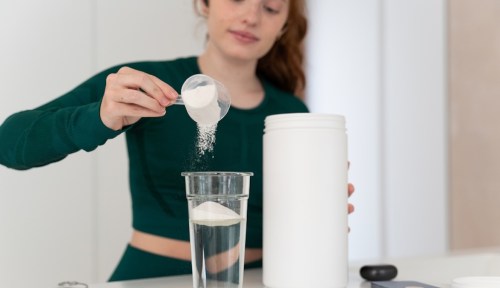If you’ve been researching the latest and greatest health supplements on the market, you may have recently stumbled upon info about colostrum benefits for adults. Often referred to as “liquid gold,” colostrum is the first liquid a mammal produces after giving birth, even before milk. If you’re chestfeeding or know someone who is, you might have heard them talk about the health benefits of giving their baby colostrum. That said, products sold today are often made out of bovine (cow) colostrum and come in powder or capsule form.
Experts in This Article
registered dietitian and owner of MPM Nutrition
a functional medicine doctor in Miami, Florida
sports dietitian and personal trainer with 180Physique Nutrition and Fitness
“Think of colostrum as the first thing the offspring of a mammal would eat,” says Shan Siddiqi, MD, a functional and anti-aging medicine doctor at NuLife Institute in Miami, Florida. He says it’s considered one of the most complete “foods” made by nature, from a nutrient perspective.
Colostrum is a rich source of immunoglobulins, vitamins, minerals, and growth factors that play a significant role in supporting an infant’s immunity and overall health as it grows. While these nutrients are essential during the first stages of life, are they necessary for adults? Is it safe, or even beneficial, to take colostrum supplements as an adult?
Below, we’ll look at five potential benefits of colostrum, and whether you should add this supplement to your routine.
5 potential benefits of bovine colostrum supplements for adults
Most colostrum supplements are made with bovine colostrum that’s been pasteurized, dried, and either left as a powder to be mixed into liquid or encapsulated into a pill. “Human colostrum comes from humans and bovine colostrum comes from cows, with research suggesting bovine colostrum is stronger,” says Marissa Meshulam, RD, a dietitian with Live Conscious Colostrum and owner of MPM Nutrition. In fact, it may be 100- to 1000-fold more potent in immunoglobulins (antibodies) and antimicrobial factors than human colostrum, per a 2017 report in Dairy in Human Health and Disease Across Lifespan1. This doesn’t necessarily mean human infants who are chestfed aren’t getting enough to build immunity; it just means bovine colostrum has potential to further boost immune function of healthy adults, per the report.
While colostrum has been studied as a supplement since 19972, the research on its benefits are limited and mixed. With that in mind, here are some purported health benefits of the supplement—specifically for gut, skin, and immune health—and what the findings indicate.
1. It’s very nutrient-dense
Colostrum’s “claim to fame” is its abundance of essential vitamins and nutrients. According to a January 2021 report in Nutrients3, those nutrients include the following:
- Vitamins (such as A, D, E, and B vitamins)
- Trace minerals (such as calcium, copper, and iron)
- Antioxidants
- Amino acids
- Immunoglobulins (antibodies)
- Growth factors
- Prebiotics
Bovine colostrum may also have more protein and fat than human colostrum, says Umo Callins, RD, CSSD, a sports dietitian and fitness coach with 180Physique Nutrition and Fitness. It also tends to have less carbohydrates (including lactose, which is a type of sugar found in milk products) than mature milk, according to Meshulam and a September 2015 review in Dairy Science and Technology4. A lower lactose content may be appealing to those who are intolerant yet want to up the protein.
Keep in Mind
Just because a supplement is considered “nutrient-dense,” doesn’t mean you have to take it. While colostrum offers the above nutrients, there are plenty of other ways to get essential vitamins and minerals, like by eating whole foods. There is also not enough evidence to say that these nutrients translate to humans in the same way they do to calves.
2. It might help support your immunity
According to Meshulam, colostrum is rich in certain immunoglobulins—i.e., antibodies our immune systems produce to fight off harmful bacteria and viruses. These antibodies are transferred from mother to baby during those initial feeding sessions. While human colostrum is made of immunoglobulin A (IgA), bovine colostrum is rich in immunoglobulin G (IgG), per a February 2022 report in Nutrients5. “IgG may be beneficial in gastrointestinal and respiratory health, which are both related to immune function,” Callins says.
That said, there is only limited research to suggest that taking bovine colostrum is associated with a reduced risk of flu or upper respiratory tract infections, per the 2021 Nutrients report. More evidence is needed to say whether the supplement truly prevents or treats these illnesses.
Additionally, bovine colostrum is also rich in antimicrobial peptides—including lactoferrin and lactoperoxidase. Some research suggests both may protect against viruses like influenza and the common cold, per a September-October 2018 study in the International Journal of Health Sciences6. But again, more evidence is needed to fully confirm this.
3. It shows promising benefits for gut health
Gut health is a popular topic of conversation right now, and rightfully so, considering about 40 percent of Americans deal with some kind of digestive issue, per an American Gastroenterological Association survey. Like many other supplements,”colostrum has gained popularity in the gut health community as a way to strengthen gut barrier and gut immunity,” says Meshulam.
She points to colostrum potentially helping “leaky gut syndrome”—a hypothetical condition based on the concept of increased intestinal permeability with certain GI conditions like IBS or IBD, per the Cleveland Clinic. Essentially, everyone’s gut is designed to absorb a certain amount of water and nutrients, but some people’s guts might have higher permeability than others. If that’s the case, foreign pathogens, bacteria, and other toxins could “leak” through, too, leading to unwanted symptoms like bloating, diarrhea, or constipation.
Some preliminary findings have associated bovine colostrum with improved gut lining and reduced inflammation. For example, a June 2022 study in Nutrients7 associated bovine colostrum supplementation with improved intestinal barriers in athletes, and a March 2021 report in Advances in Nutrition8 found the supplement could aid in preventing inflammatory damage associated with IBD. But these studies are small; more evidence is needed to confirm whether colostrum can actually help treat “leaky gut” or other GI conditions like IBS and IBD.
Ultimately, if you’re having gut health issues, it’s best to see your doctor to get a proper diagnosis and treatment.
4. It may support muscle growth
According to the Advances in Nutrition report, colostrum is rich in growth factors—the most prominent being insulin-like growth factor one (IGF-1) and two (IGF-2). The former is thought to help with cell growth and repair and metabolism of certain macronutrients. But does it help with muscle growth and repair too?
While some people say colostrum has helped them build muscle (and there are certainly studies exploring this potential connection), there isn’t enough evidence at this time to support these claims, per a June 2021 review in Nutrients109. There are other, more medically proven ways to support muscle growth, like through exercise, eating a well-balanced diet, and getting enough sleep.
5. It might help with skin health
Colostrum may help support skin health, but once again, the research here is still very limited. According to Dr. Siddiqi, colostrum may help activate collagen production, strengthen the skin barrier, and guard against damage caused by pollutants, toxins, and UV light. He says this is due to ingredients like antioxidants, prebiotics, and peptides found in colostrum. (Though you can reap these benefits with other, more widely studied products on the market.)
Most studies looking at colostrum for skin health are in vitro, meaning, they’re lab studies performed on isolated human cells. This includes a May 2021 study in Journal of Drugs in Dermatology11, which showed that colostrum applied topically was able to modulate age-related decline to skin cells, and a January 2022 study in Pharmaceutics12, which found that colostrum has the potential to even reverse sun damage in aging skin. Still, human research needs to be done in order to better support these findings. The best way to protect your skin from sun damage is by wearing SPF and protective clothing like hats and sunglasses.
Side effects and risks of taking colostrum
First things first: It’s important to note that supplements like colostrum are not regulated by the Food and Drug Administration (FDA). This means, there can be discrepancies in ingredients, nutrition values, and health benefits when it comes to these products; the claims made on product labels may not align with what’s actually in the supplement.
That said, there aren’t any recorded side effects or risks of taking colostrum, unless you have a known dairy or soy allergy (some supplements contain soy as an additive). If you have allergies—or think you do—always check a supplement’s label for allergen statements and talk to your doctor before testing it out.
People who are pregnant or breastfeeding/chestfeeding should also talk to their doctor before trying colostrum, as there’s not enough information about whether it’s safe for this group. “I always recommend working with your own provider, such as your doctor or dietitian, before starting a new supplement,” Meshulam says.
What to look for in a colostrum supplement
While there are some studies showing the potential benefits of colostrum, it’s not really a necessary supplement for your overall health. If anything, you’re likely better off reaping the same health benefits by sticking to a balanced, nutrient-dense diet filled with fruits, veggies, protein, and healthy fats.
But if you’re still set on trying colostrum supplements out, make sure you are looking for the best quality brands. “Supplements aren’t regulated by the FDA, and the quality of bovine colostrum supplements can vary based on many factors such as the breed and/or age of the cow, how the colostrum is processed, and more,” Callins says. For example: Try to find supplements either from USDA Grade-A cows and/or from Holstein or Brown Swiss dairy cows, which are thought to have colostrum with the highest IgG content, according to an August 2020 study in the Journal of Animal Science.
You’ll also want to look for a brand that’s third-party tested (from laboratories like NSF, USP, or ConsumerLab), which helps ensure the supplement’s quality, safety, and purity. It may also help to buy colostrum sourced from grass-fed cows, or made in FDA-certified facilities.
The bottom line
The jury’s still out about whether colostrum actually has a positive effect on your gut, skin, and immune health. If anything, you’re likely better off just sticking to whole foods (like fruits, veggies, protein, and healthy fats) to see improvement in your overall health.
If you’re curious about taking it for improved gut health, reaching out to a gastroenterologist first about your concerns and symptoms is ideal. They can offer guidance about whether or not taking colostrum will help. And as far as skin and muscle health go, we still do not have enough research to fully confirm these benefits. “With most things in nutrition research, we are awaiting good human studies to substantiate this claim, but the growing body of in vitro research along with animal studies show promising results,” Meshulam says.
—reviewed by Jennifer Gilbert, MD, MPH
Watson, R. R., Collier, R. J., & Preedy, V. R. (2017). Dairy in human health and disease across the lifespan. Academic Press.
↩︎Mero, A et al. “Effects of bovine colostrum supplementation on serum IGF-I, IgG, hormone, and saliva IgA during training.” Journal of applied physiology (Bethesda, Md. : 1985) vol. 83,4 (1997): 1144-51. doi:10.1152/jappl.1997.83.4.1144
↩︎Playford, Raymond John, and Michael James Weiser. “Bovine Colostrum: Its Constituents and Uses.” Nutrients vol. 13,1 265. 18 Jan. 2021, doi:10.3390/nu13010265
↩︎McGrath, B.A., Fox, P.F., McSweeney, P.L.H. et al. Composition and properties of bovine colostrum: a review. Dairy Sci. & Technol. 96, 133–158 (2016). https://doi.org/10.1007/s13594-015-0258-x
↩︎Mehra, Rahul et al. “Insights into the Research Trends on Bovine Colostrum: Beneficial Health Perspectives with Special Reference to Manufacturing of Functional Foods and Feed Supplements.” Nutrients vol. 14,3 659. 4 Feb. 2022, doi:10.3390/nu14030659
↩︎Shin, Kouichirou et al. “Effects of orally administered lactoferrin and lactoperoxidase on symptoms of the common cold.” International journal of health sciences vol. 12,5 (2018): 44-50.
↩︎Dziewiecka, Hanna et al. “A Systematic Review of the Influence of Bovine Colostrum Supplementation on Leaky Gut Syndrome in Athletes: Diagnostic Biomarkers and Future Directions.” Nutrients vol. 14,12 2512. 17 Jun. 2022, doi:10.3390/nu14122512
↩︎Sienkiewicz, Michał, et al. “Supplementation of bovine colostrum in inflammatory bowel disease: Benefits and contraindications.” Advances in Nutrition, vol. 12, no. 2, Mar. 2021, pp. 533–545, https://doi.org/10.1093/advances/nmaa120.
↩︎Blair, Merran et al. “Health Benefits of Whey or Colostrum Supplementation in Adults ≥35 Years; a Systematic Review.” Nutrients vol. 12,2 299. 22 Jan. 2020, doi:10.3390/nu12020299
↩︎Davison, Glen. “The Use of Bovine Colostrum in Sport and Exercise.” Nutrients vol. 13,6 1789. 24 May. 2021, doi:10.3390/nu13061789
↩︎Jogi, Reena et al. “Bovine Colostrum, Telomeres, and Skin Aging.” Journal of drugs in dermatology : JDD vol. 20,5 (2021): 538-545. doi:10.36849/JDD.5851
↩︎Han, Geonhee et al. “The Potential of Bovine Colostrum-Derived Exosomes to Repair Aged and Damaged Skin Cells.” Pharmaceutics vol. 14,2 307. 27 Jan. 2022, doi:10.3390/pharmaceutics14020307
↩︎
Sign Up for Our Daily Newsletter
Get all the latest in wellness, trends, food, fitness, beauty, and more delivered right to your inbox.
Got it, you've been added to our email list.










